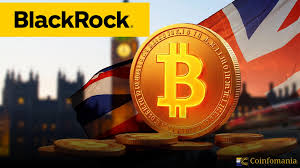Imagine this: It’s a drizzly Tuesday morning in London, and instead of queueing at your local bank, you’re sipping Earl Grey while buying Bitcoin exposure through your Individual Savings Account (ISA)—completely tax-free. Sounds surreal, right? Well, it’s becoming a reality, courtesy of BlackRock, the $11 trillion asset management titan that’s been quietly reshaping the financial world. On October 8, 2025, BlackRock officially launches its iShares Bitcoin Exchange-Traded Product (ETP) on the London Stock Exchange (LSE)—just days after the Financial Conduct Authority (FCA) lifted its long-standing retail ban on crypto ETNs (Exchange-Traded Notes) (Coinpedia).
For many investors who’ve weathered the crypto rollercoaster since the chaotic Mt. Gox days, this marks a historic turning point. No more offshore exchanges, no more self-custody headaches—just simple, regulated Bitcoin exposure via mainstream markets. This moment represents not just financial innovation but also Wall Street’s full embrace of crypto, and the UK’s own comeback as a global fintech powerhouse.
The Regulatory Judo Flip: FCA’s Big Crypto Pivot
To appreciate this shift, let’s rewind to January 2021, when the FCA effectively banned retail investors from buying crypto ETNs, citing extreme volatility and the risk of total losses. At the time, they argued that crypto markets were too unpredictable, too opaque, and too prone to scams and hacks (The Paypers). For four years, these products were restricted to professionals, leaving regular Brits to navigate unregulated crypto exchanges like Binance or Coinbase UK.
Fast-forward to 2025, and the narrative has evolved dramatically. With Bitcoin trading at around $114,000—fueled by the 2024 halving and a flood of institutional interest—the FCA found itself at a crossroads. After watching the success of U.S. Bitcoin ETFs led by BlackRock and Fidelity, the FCA decided it was time for a controlled comeback. The new rules, effective October 8, allow retail access again—but with strict safeguards, including transparent risk disclosures, limited marketing, and listings only on vetted exchanges like the LSE (Finance Yahoo).
This wasn’t a rash decision; it was grounded in data and consultation. The FCA noted that the crypto landscape has matured significantly, with better custody solutions and clearer regulations (Coinfomania). On social media, the excitement is palpable—users are calling it “the gateway to crypto legitimacy” (@Umairorkz). The UK, post-Brexit, is finally positioning itself as Europe’s fintech vanguard.
BlackRock’s Crypto Odyssey: From Wall Street Skeptic to Bitcoin Believer
It’s hard to overstate how monumental BlackRock’s U-turn has been. The firm, often viewed as the beating heart of traditional finance, has gone from Bitcoin skeptic to blockchain believer in record time. Back in 2017, CEO Larry Fink dismissed crypto as “index funds on steroids”—a speculative craze with no fundamentals. Yet by 2023, the tone shifted completely as the company filed for a spot Bitcoin ETF in the U.S. The result? The iShares Bitcoin Trust (IBIT), which launched in January 2024, and quickly amassed over $48 billion in assets—becoming one of the fastest-growing ETFs in history (Invezz).
Europe followed suit soon after. By March 2025, BlackRock had already rolled out its iShares Bitcoin ETP on Euronext Paris, Amsterdam, and Frankfurt, domiciled in Switzerland for regulatory stability (Reuters). Its competitive fee structure—starting at 0.15% and rising to just 0.25%—underpriced rivals like CoinShares and 21Shares (Crypto News).
The UK debut, however, is the crown jewel. This LSE-listed Bitcoin ETP mirrors IBIT’s design, tracking spot Bitcoin and offering full physical backing via Coinbase Custody. Most importantly, it’s ISA-eligible, meaning UK investors can enjoy tax-free Bitcoin exposure—a groundbreaking advantage in one of the world’s most heavily taxed financial markets (Coinpedia).
Peeling Back the ETP Onion: How It Actually Works
At its core, an Exchange-Traded Product (ETP) is a traditional investment vehicle—think of it as a Bitcoin tracker wrapped in regulatory silk. Each share represents exposure to Bitcoin, held securely in cold storage. Investors buy and sell shares through their usual brokers—Hargreaves Lansdown, Interactive Investor, or AJ Bell—just like any other stock (TronWeekly).
The pros are clear: seamless liquidity, institutional-grade security, and full FCA oversight. BlackRock’s fee structure, capped at 0.25%, is one of the lowest in Europe, making it an appealing choice for both seasoned investors and cautious newcomers. And because it’s backed by BlackRock’s AAA credit rating, the counterparty risk is minimal compared to smaller issuers (Crypto News).
That said, investors should remain aware of the limitations. ETP holders don’t own Bitcoin directly, so they miss out on airdrops, forks, and the self-custody ethos of crypto. Furthermore, since ETPs are technically unsecured debt instruments, if BlackRock ever faced insolvency, investors would be creditors, not owners (Finance Yahoo). Still, with BlackRock’s fortress balance sheet and Coinbase’s proven custody track record, the odds of such a scenario are remote.
Bitcoin’s British Invasion: Market Impact and Momentum
The macro implications are massive. With over 5 million crypto-curious retail investors in the UK (CryptoTimes), this launch opens the floodgates for institutional and retail capital alike. Analysts project that £10–20 billion could pour into Bitcoin within the first year through ISAs and pension-linked funds. This isn’t just new money—it’s smart, regulated capital entering the market.
Globally, BlackRock’s presence legitimizes Bitcoin like never before. While Europe already hosts 20+ crypto ETPs from firms like WisdomTree and 21Shares, none carry the same weight or trust as BlackRock. Its entry could push other financial hubs like Singapore and Hong Kong to fast-track their own approvals (Finance Yahoo; Blockchain News).
Bitcoin’s price trajectory reflects this optimism. Following the U.S. ETF approvals in 2024, BTC surged nearly 20% in a month. With the UK ETP now in play, many analysts expect another 5–10% rise by year’s end. On X, traders are calling it the “Queen’s crypto coronation” (@CoinpediaNews).
Risks, Realities, and Regulatory Speed Bumps
Of course, it’s not all smooth sailing. The FCA remains cautious, emphasizing that crypto remains highly volatile and unsuitable for all investors. A sudden 30% BTC drop could devastate portfolios that lack diversification (The Paypers). Environmental concerns also linger—Bitcoin’s energy consumption remains a thorn in regulators’ sides (Coinfomania).
Then there’s reputational risk. The shadow of FTX’s collapse still looms large, and public trust in crypto institutions remains fragile. BlackRock’s brand strength helps mitigate that, but one operational misstep could reignite regulatory backlash. Critics within the Bank of England warn of potential systemic risks if crypto assets become too intertwined with traditional markets (Coinfomania).
Still, many analysts argue that regulated access is safer than underground speculation. The new ETPs provide transparency, audited reserves, and institutional oversight—features that unregulated exchanges can’t match.
Horizon Gazing: BlackRock’s Next Crypto Chapter
This UK debut is just the opening act in BlackRock’s grand crypto playbook. Industry insiders suggest the company is already preparing Ethereum ETPs and exploring tokenized treasury products tied to blockchain infrastructure (CoinGabbar). With more than $100 billion in digital asset exposure already under management, BlackRock clearly views blockchain as the next great financial frontier.
By 2026, analysts predict that over 50% of UK investment portfolios will include at least 1–2% crypto exposure—a figure that seemed unthinkable just a few years ago. The lines between traditional finance (TradFi) and decentralized finance (DeFi) are blurring faster than ever, and BlackRock is leading that charge.
Frontline Chatter: What Investors Are Saying
On X (formerly Twitter), the mood is jubilant. Coin Bureau’s post about the FCA’s reversal gathered thousands of likes, with users calling it “the moonshot moment for UK crypto” (@CoinBureau). Traders are particularly thrilled about ISA eligibility, which effectively turns Bitcoin into a tax-sheltered asset class. One user summed it up perfectly: “Tax-free Bitcoin—goodbye gilts, hello gains.”
Institutional voices echo that sentiment. A Fidelity spokesperson described the move as “the bridge we’ve all been waiting for.” Retail investors, meanwhile, celebrate the simplicity—no private keys, no fear of hacks, just direct access through trusted brokers.
Sealing the Deal: Why October 2025 Changes Everything
As the countdown to October 8 ticks away, it’s clear that BlackRock’s iShares Bitcoin ETP isn’t just another product—it’s a paradigm shift. The FCA’s regulatory evolution, the LSE’s open-door policy, and the world’s largest asset manager embracing crypto all converge into a single truth: digital assets are no longer fringe—they’re foundational.
For British investors, this means empowerment and opportunity. For Bitcoin, it means validation and momentum. Yet the golden rule still applies—Do Your Own Research (DYOR). Volatility remains part of the crypto DNA, but for those with conviction, this could be the most defining investment chapter of the decade.
Whether you’re bullish or skeptical, one thing’s certain: the revolution is retail now, and its epicenter is London.
References
- Coinpedia
- The Paypers
- Finance Yahoo
- Invezz
- Reuters
- Crypto News
- Coinfomania
- TronWeekly
- CryptoTimes
- Blockchain News
- CoinGabbar
- [X.com posts: @CoinpediaNews, @CoinBureau, @Umairorkz, @trades88, @haji_whiskey]



























